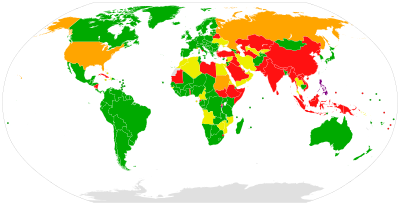| Rome Statute of the International Criminal Court | |
|---|---|
 Parties and signatories of the Statute
State party
Signatory that has not ratified
State party that subsequently withdrew its membership
Signatory that subsequently withdrew its signature
Non-party, non-signatory | |
| Drafted | 17 July 1998 |
| Signed | 17 July 1998[1] |
| Location | Rome, Italy[1] |
| Effective | 1 July 2002[2] |
| Condition | 60 ratifications[3] |
| Signatories | 137[2] |
| Parties | 125[2] |
| Depositary | UN Secretary-General[1] |
| Languages | Arabic, Chinese, English, French, Russian and Spanish[4] |
| Full text | |
| https://www.un.org/law/icc/index.html | |

The Rome Statute of the International Criminal Court is the treaty that established the International Criminal Court (ICC).[5] It was adopted at a diplomatic conference in Rome, Italy on 17 July 1998[6][7] and it entered into force on 1 July 2002.[2] As of October 2024, 125 states are party to the statute.[8] Among other things, it establishes court function, jurisdiction and structure.
The Rome Statute established four core international crimes: genocide, crimes against humanity, war crimes, and the crime of aggression. Those crimes "shall not be subject to any statute of limitations".[9] Under the Rome Statute, the ICC can only investigate and prosecute the four core international crimes in situations where states are "unable" or "unwilling" to do so themselves.[10] The jurisdiction of the court is complementary to jurisdictions of domestic courts. The court has jurisdiction over crimes only if they are committed in the territory of a state party or if they are committed by a national of a state party. An exception to this rule is that the ICC may also have jurisdiction over crimes if its jurisdiction is authorized by the United Nations Security Council.
- ^ a b c Article 125 of the Rome Statute Archived 19 October 2013 at the Wayback Machine. Retrieved on 18 October 2013.
- ^ a b c d Cite error: The named reference
UN treaty databasewas invoked but never defined (see the help page). - ^ Article 126 of the Rome Statute Archived 19 October 2013 at the Wayback Machine. Retrieved on 18 October 2013.
- ^ Article 128 of the Rome Statute Archived 19 October 2013 at the Wayback Machine. Retrieved on 18 October 2013.
- ^ "The Rome Statute" (PDF). International Criminal Court. Archived (PDF) from the original on 9 April 2023. Retrieved 27 November 2023.
- ^ Michael P. Scharf (August 1998). Results of the Rome Conference for an International Criminal Court Archived 15 May 2012 at the Wayback Machine. The American Society of International Law. Retrieved on 31 January 2008.
- ^ Each year, to commemorate the adoption of the Rome Statute, human rights activists around the world celebrate 17 July as World Day for International Justice. See Amnesty International USA (2005). International Justice Day 2005 Archived 2 May 2008 at the Wayback Machine. Retrieved on 31 January 2008.
- ^ "Rome Statute of the International Criminal Court". United Nations Treaty Collection. 26 October 2024. Retrieved 26 October 2024.
- ^ Article 29, Non-applicability of statute of limitations
- ^ "International Criminal Court prosecutor calls for end to violence in Gaza". Reuters. Amsterdam. 8 April 2018. Retrieved 27 November 2023.